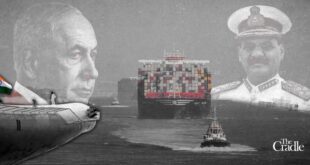Hizbollah declares victory as thousands of refugees rush back to blitzed villages in southÂ
BEIRUT (Reuters) — A fragile UN-ordered truce took hold in Lebanon on Monday after Israel’s monthlong war with Hizbollah fighters, prompting thousands of refugees to rush back to blitzed villages in the south.
Hizbollah chief Sayyed Hassan Nasrallah said his fighters had achieved a “strategic and historic victory” over Israel and that it was the “wrong time” to publicly discuss disarming them.
He said Hizbollah would immediately begin repairing homes damaged by Israeli strikes and would pay a year’s rent and other costs to help the owners of about 15,000 destroyed houses.
Nasrallah chastised Lebanese politicians who had begun talking publicly about Hizbollah disarming. “There is a mistake in timing, both psychologically and morally,” he said, noting the destruction just meted out to Shiite areas of Lebanon.
Nasrallah was speaking on television about 12 hours after a UN truce halted fighting between Hizbollah and Israel.
Ground clashes, along with Israeli air strikes and Hizbollah rocket fire, ceased after the 0500 GMT deadline, but the Israeli army said its troops had shot five Hizbollah fighters, killing at least one, after the truce. The troops had felt threatened.
UN Secretary General Kofi Annan said he was relieved that the cessation of hostilities “appears to be generally holding”.
The truce prompted tens of thousands of Lebanese who had fled the fighting to head south, choking bomb-damaged roads with their cars in spite of a warning from Israel not to return to the area.
Drivers honked their horns in celebration.
Ahmed Nassereddine arrived in the village of Shihabiyeh to find out that his building and petrol station had been destroyed by an Israeli air strike just 10 minutes before the truce.
Â
‘Property can be replaced’
Â
“Thank God, we survived. Property can be replaced, souls can’t,” he said, holding back tears.
In northern Israel, soldiers coming out of Lebanon were greeted with hugs and handshakes by their comrades. Streets became busier as residents emerged from homes and bomb shelters.
“I feel safer,” said 12-year-old Johnny Wena, riding his bicycle through the streets of Metula.
Israel launched the war after Hizbollah fighters captured two Israeli soldiers in a cross-border raid on July 12.
Annan urged the sides to consolidate the halt to hostilities and move swiftly to convert it to a lasting ceasefire.
The White House said disarming Hizbollah would probably require border security arrangements in Lebanon to block arms supplies to the group from its allies, Iran and Syria.
The UN resolution calls for a ban on arms supplies to groups in Lebanon, but does not say how it should be enforced.
An Israeli military source said an air and sea blockade of Lebanon would remain until the arms embargo was implemented.
Israeli Prime Minister Ehud Olmert told parliament Israel would pursue Hizbollah’s leaders “everywhere and any time”.
About 1,110 people in Lebanon and 156 Israelis have been killed in the war. Israel says it killed about 530 Hizbollah fighters. Hizbollah has acknowledged only about 80 dead.
Â
‘Thorough investigation’
Â
Thousands of Israeli troops remain in southern Lebanon.
Israel has said they will not withdraw fully until an expanded UN peacekeeping force arrives alongside Lebanese troops.
The commander of an existing UN force in Lebanon, Major-General Alain Pellegrini, met senior Lebanese and Israeli army officials at the border to discuss implementing the UN resolution on ending fighting.
Israeli Defence Minister Amir Peretz pledged a “wide and thorough” investigation of the war. Opinion polls show almost all Israelis supported it, but many criticise its handling.
Olmert acknowledged “shortcomings” in the conduct of the war and told parliament he bore full responsibility.
Aid groups said they needed swift access to the south to help 100,000 people stranded south of the Litani River.
“There can no longer be any no-go areas in Lebanon,” said David Shearer, the UN humanitarian coordinator in Lebanon.
Under the resolution adopted by the UN Security Council on Friday, Israeli forces must start to withdraw as UN
peacekeepers and Lebanese soldiers are deployed in the south to keep an area between the Litani and the border free of other armed groups.
Hizbollah has said it will cooperate with the Lebanese and UN troops, but has not promised to withdraw its fighters or disarm — even though it has accepted the UN resolution.
The truce has not resolved many key issues including the fate of the two captured Israeli soldiers and the Shebaa Farms area which is claimed by Lebanon but occupied by Israel.Â
 Eurasia Press & News
Eurasia Press & News



